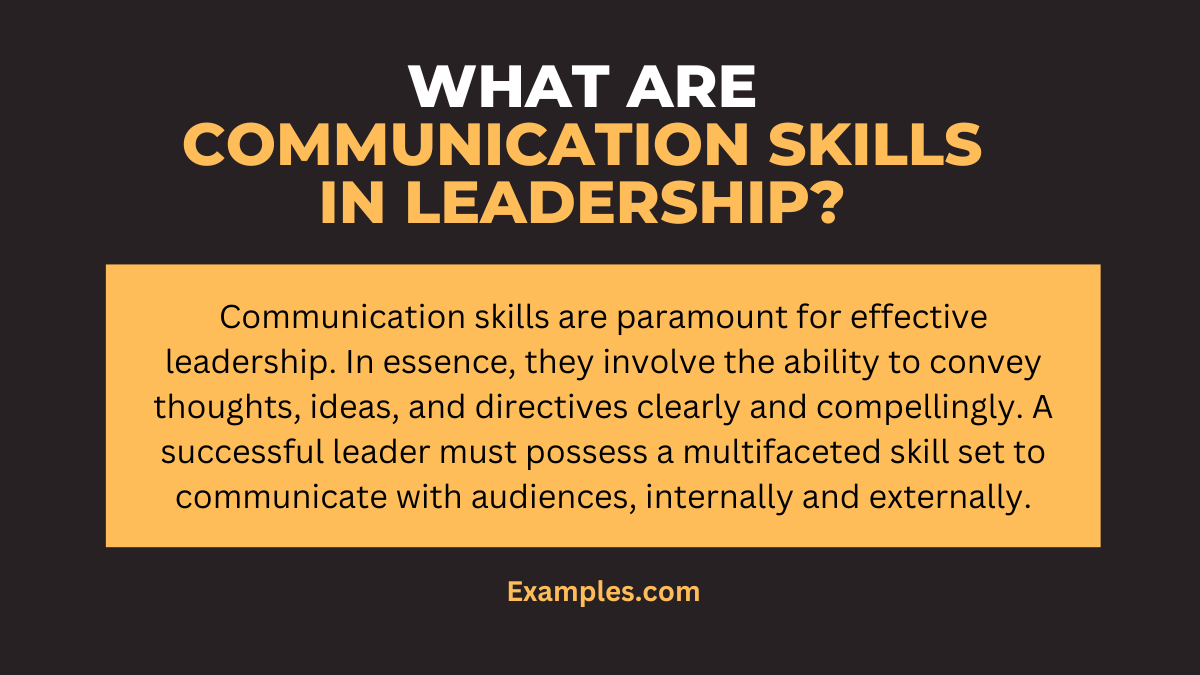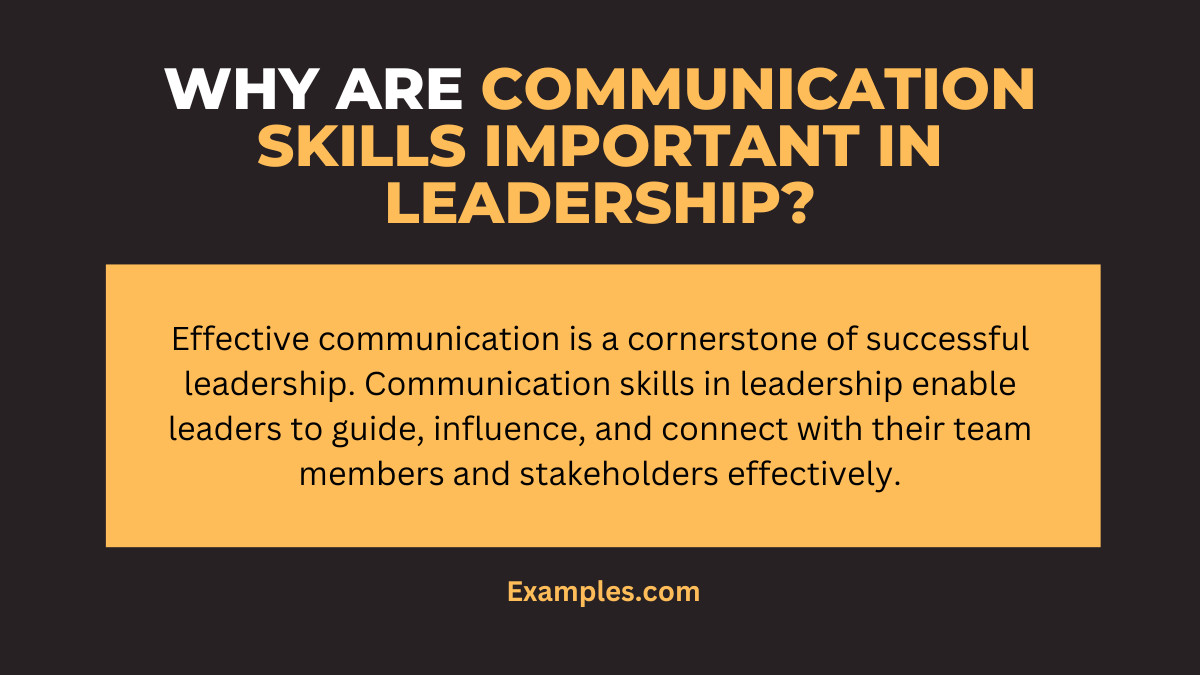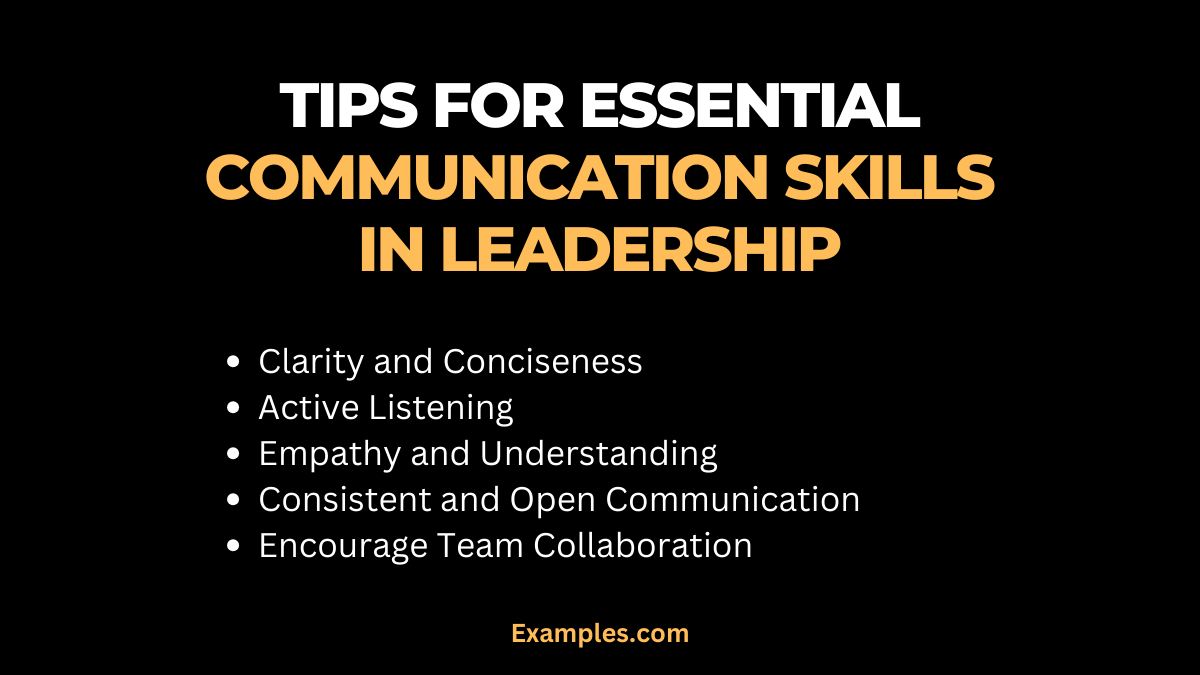19+ Communication Skills in Leadership Examples
Leadership success hinges significantly on the ability to communicate effectively. This guide delves into the critical role of communication skills in leadership, illustrating with practical communication examples. Explore how leaders use these skills to inspire, motivate, and guide their teams towards shared goals. From active listening to clear and impactful speaking, this resource provides insights into the communication strategies that effective leaders employ. Whether in business, politics, or community roles, mastering these skills is crucial for any aspiring or established leader.
20 Communication Skills in Leadership Examples
Effective leadership is deeply rooted in strong communication skills. This section presents 20 unique and distinct examples of how leaders can communicate effectively in various scenarios. These examples, accompanied by explanations and communication sentences, demonstrate the application of skills like active listening, clear articulation, and motivational speaking. They serve as practical illustrations for leaders to enhance their leadership communication abilities in diverse settings, from board meetings to team huddles.
- Vision Articulation: “Our goal is to innovate and lead in our industry.”
Expresses a clear and inspiring vision for the organization. - Empathetic Listening: “I understand your concerns, let’s explore solutions together.”
Shows empathy and readiness to address team issues. - Delegating Tasks Effectively: “I trust your skills in managing this project.”
Delegates responsibilities while expressing confidence in team members. - Constructive Feedback: “Great job on the presentation. For next time, let’s add more data analysis.”
Offers specific, constructive feedback for improvement. - Encouraging Open Communication: “Your ideas are valuable, feel free to share them anytime.”
Fosters an environment where team members can freely express their thoughts. - Crisis Communication: “In response to the crisis, here’s our strategy to move forward.”
Communicates a clear plan during challenging times. - Motivational Speaking: “Together, we have the potential to achieve remarkable success.”
Motivates and uplifts the team towards common objectives. - Conflict Resolution: “Let’s discuss and find a middle ground that works for everyone.”
Mediates conflicts with a focus on collaborative solutions. - Transparency in Decision-Making: “I want to explain the rationale behind our latest decision.”
Provides clarity and transparency in organizational decisions. - Acknowledging Team Efforts: “Your hard work has been instrumental in our project’s success.”
Recognizes and appreciates team contributions. - Setting Clear Expectations: “Here are our objectives for this quarter and everyone’s role in achieving them.”
Outlines clear goals and expectations. - Building Rapport: “How was your weekend? Let’s catch up before we start our meeting.”
Engages in small talk to build rapport with team members. - Inspiring Change: “Change is a path to growth, and together we can embrace it.”
Encourages a positive attitude towards change. - Negotiating Skillfully: “Let’s find a solution that benefits both our team and our clients.”
Demonstrates negotiation skills for mutual benefit. - Inclusive Leadership: “I value diverse perspectives, so let’s hear from everyone on this.”
Promotes inclusivity and values diverse viewpoints. - Effective Email Communication: “As outlined in my email, these are our next steps…”
Communicates key information clearly and effectively via email. - Strategic Communication: “Our strategy aligns with our long-term goals in these ways…”
Links communication to the organization’s strategic objectives. - Team Meeting Facilitation: “Today’s agenda is focused on project updates and team feedback.”
Effectively leads and manages team meetings. - Persuasive Communication: “Investing in this technology now will benefit us in the long run.”
Persuasively presents ideas to influence decisions. - Cultural Sensitivity: “Being mindful of cultural differences, let’s approach this project in a way that respects all viewpoints.”
Shows awareness and respect for cultural diversity.
What are Communication Skills in Leadership?

Communication skills are paramount for effective leadership. In essence, they involve the ability to convey thoughts, ideas, and directives clearly and compellingly. A successful leader must possess a multifaceted skill set to communicate with diverse audiences, both internally and externally.
Leadership communication is not just about talking; it’s about conveying a vision and inspiring action. Effective communicators in leadership positions foster collaboration, build trust, and ensure that their team is aligned with organizational goals. These skills encompass verbal and non-verbal communication, active listening, and the capacity to adapt communication styles to different situations.
Verbal and Non-Verbal Communication
Verbal communication involves the use of words, tone, and pacing. A leader’s words should be chosen judiciously to convey authority, empathy, and clarity. Meanwhile, non-verbal cues, such as body language and facial expressions, play a crucial role in conveying emotions and intentions.
In leadership, mastering both verbal and non-verbal communication is pivotal for fostering a positive and collaborative work environment.
Active Listening
Leadership is a two-way street, and active listening is a cornerstone of effective communication. Leaders who actively listen demonstrate empathy and understanding, creating a culture where team members feel valued and heard. This fosters open communication channels, which are vital for problem-solving and innovation.
Active listening involves not only hearing words but understanding the underlying emotions and concerns, creating a more connected and engaged team.
Adaptability in Communication Styles
Effective leaders recognize that one size does not fit all when it comes to communication. They tailor their approach to the audience, considering factors such as individual preferences, cultural differences, and the nature of the message. This adaptability ensures that the message resonates with diverse team members.
Being adaptable in communication styles allows leaders to connect with team members on a personal level, promoting a more inclusive and collaborative work environment.
Why are Communication Skills Important in Leadership?

Effective communication is a cornerstone of successful leadership. Communication skills in leadership enable leaders to guide, influence, and connect with their team members and stakeholders effectively.
Enhancing Team Dynamics
- Clarity in Vision and Goals: Clear communication ensures that everyone understands the organization’s vision and objectives.
- Motivating and Inspiring Teams: Leaders use communication to motivate and inspire, fostering a positive work environment.
Building Trust and Relationships
- Trust and Credibility: Transparent and honest communication builds trust and credibility among team members.
- Rapport Building: Effective communication helps in building strong relationships within teams.
Facilitating Decision Making and Problem-Solving
- Collaborative Decisions: Open communication encourages collaboration and better decision-making.
- Conflict Resolution: Good communication skills are key in resolving conflicts and finding effective solutions.
Communication skills in leadership are indispensable for guiding teams, making informed decisions, and building a cohesive and motivated workforce.
How to Improve Leadership Communication Skills?
Improving communication skills is a continuous process, especially in leadership roles. Here’s how leaders can enhance their communication abilities:
Continuous Learning and Development
- Educational Resources: Utilize books, webinars, and workshops focused on leadership communication.
- Professional Training: Engage in training programs specifically designed for communication skill development in leadership.
Practice and Self-Reflection
- Real-World Application: Practice learned communication techniques in everyday interactions.
- Reflect on Interactions: Regularly reflect on communication instances to identify areas for improvement.
Seeking Feedback
- Peer Review: Request feedback from colleagues and mentors on communication style and effectiveness.
- Employee Feedback: Encourage team members to provide honest feedback on leadership communication.
Staying Informed
- Industry Trends: Keep abreast of the latest trends and best practices in leadership communication.
- Technological Advancements: Adapt to new communication technologies and platforms that can enhance leader-team interactions.
Tips for Essential Communication Skills in Leadership

Effective communication in leadership is essential for inspiring and guiding teams. Here are some tips for leaders to communicate more effectively:
Clarity and Conciseness
- Clear Messaging: Ensure that the message is clear and concise to avoid misunderstandings.
- Goal-Oriented Communication: Tailor conversations to align with team goals and objectives.
Active Listening
- Engage in Active Listening: Pay close attention to what team members say to understand their perspectives.
- Encourage Dialogue: Create an environment where team members feel comfortable expressing their thoughts.
Empathy and Understanding
- Show Empathy: Understand and consider the feelings and viewpoints of team members.
- Emotional Intelligence: Develop emotional intelligence to better manage and respond to various communication scenarios.
Consistent and Open Communication
- Regular Updates: Keep the team informed about developments, changes, and expectations.
- Open-Door Policy: Maintain an approachable demeanor so team members feel at ease to share their ideas and concerns.
Encourage Team Collaboration
- Foster Team Discussions: Encourage open discussions and brainstorming sessions.
- Value Diverse Opinions: Respect and consider different viewpoints to enhance team collaboration and innovation.
By implementing these strategies, leaders can significantly improve their communication skills, leading to more effective team management and better organizational outcomes.
In conclusion, the mastery of communication skills in leadership is pivotal for guiding and motivating teams towards success. Effective leaders who practice empathetic listening, clear messaging, and encourage open dialogue create an environment of trust and collaboration. These skills are indispensable in shaping influential leaders capable of inspiring positive change and fostering a cohesive, goal-oriented workplace culture.



